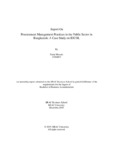Procurement management practices in the public sector in Bangladesh: A case study on IDCOL
Abstract
Procurement is the act of obtaining goods or services, typically for business purposes whereas
public procurement involves acquisition through contracts of goods, works, or services
required by governments. In Bangladesh, public procurement contributes directly to the
development of our country. As a Government owned financial institution, IDCOL has been
working to support the Government of Bangladesh (GoB) in meeting its national target and to
attain significant progress of SDGs in Bangladesh using its intricate procurement process. It
follows a certain plan and principles while being managed by an overviewing committee.
Different kinds of procurement are done using approved selection methods for goods, works
and non-consulting as well as consulting services. In terms of tenders, certain evaluation
procedures are maintained.
Still, IDCOL faces some risks in their procurement management system. For this, certain
measures are taken to minimize the risks, such as, Project Procurement Strategy for
Development (PPSD), creating a bid evaluation committee introducing STEP system,
identification of Procurement Focal Persons (PFP) and other due-diligence measures.
However, huge downsides have been seen in dealing with the risks. For example, selection of
contractors, protection, liquidated damage, charge installment etc. Enough budget allocation,
commitment of timely payment, committed performance from the suppliers, application of
liquidity damage clause, submission of enough portion of documents with every tender and
implementation of E-Procurement system etc. can be up brought to address these risks.

